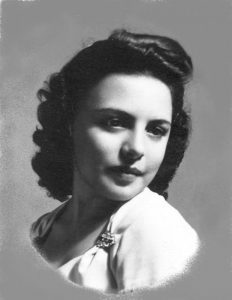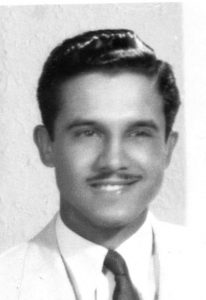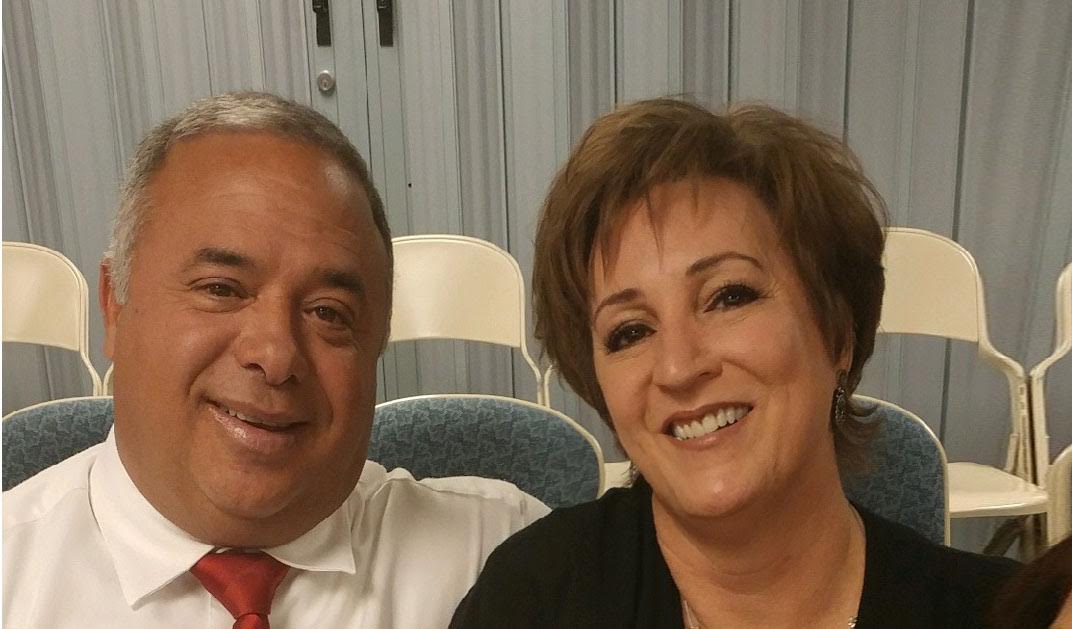When Brother and Sister Bori were called to give their sacrament talks in February 2017, both were inspired to bear witness about the Church as a modern refuge.
Hector Bori, whose great-great-grandfather emigrated from Spain in the 1800’s, was a citizen of Communist Cuba in 1959. Along with his parents and 6 siblings, the Bori family inhabited a 6300 acre stretch of property handed down from generation to generation. With a life so ingrained in their cattle and rice farming, the choice to leave was clearly one surrounded by complication.

Hector Bori’s Mother

Hector’s father
The late 1950s saw Cuba in an era of tumultuous political upheaval. With the Cuban Revolution coming to its end, Fidel Castro‘s 26th of July Movement sought to overthrow the authoritarian government of Cuban President Fulgencio Batista and replace it with the first Communist government on the Western Hemisphere.
Sister Holi Bori, speaking of her husband’s childhood in her own words, remarked on Castro’s methods as being similar to the Adversary, and how their family was faced with a difficult choice:
Much like Satan, who works by degrees, Fidel Castro also worked by degrees to ensnare the Cuban people. Little by little, [Castro] had situated himself as their dictator. First, he took over the media. All newspaper, [as well as] radio and television broadcasts were in the control of the government. And so the propaganda began. Everything the Cuban people read, heard, or watched was informing them that the United States of American was making preparations to invade and take over their island. With nothing to denounce these lies and deceptions, the majority of the people began to believe and be fearful that indeed the U.S. would invade them.
My husband’s father was not among those that fell for the rhetoric being spouted by the government. […H]e had a brother that lived in New York, in whom he trusted and who informed him that the US invasion story was false. This belief, however, he made sure to keep to himself. The communist government had put a program in place that would expose those who were against them.
Imagine your neighborhood. Now, imagine that one family in your neighborhood is a spy for the government. No one knows who it is. It might be your next door neighbor, or your next door neighbor may think it is you. No one trusted anyone and did not dare to speak ill of Castro or the government, and those that did, many times, disappeared.
Next, Castro disarmed the people of all firearms. He said that the Cuban military was in short supply of guns and ammo [and] that in order to prepare and build up their military for the invasion of the U.S., every Cuban patriot had an obligation to help arm the military. And so they did. The citizens gave over their firearms. With only the government’s form of media and no personal firearms to fight against a repressive government, the only thing left to do to completely oppress the Cuban people would be to indoctrinate the children.
Here in the United States, children are taught to stand and repeat the Pledge of Allegiance. Cuban children were taught to stand and pledge allegiance to Fidel Castro. In this pledge, they would acknowledge that Castro gave them everything and was the reason for their happiness. That because of him, they have a home, food, and a school to go to. No one was allowed to give credit to God for any goodness in their life, [as] it was all credited to Castro. In fact, no religion was allowed after Castro took over. Children were encouraged to turn in their parents to government officials if things were being taught otherwise in the home.
This is the environment my husband and his family found themselves in. But in 1964, two drastic things happened that would put this family on the path to recognizing the goodness and love that our Heavenly Father had in store for them.
The first thing was when two government officials showed up at their home and informed them that their land, cattle, rice fields and house no longer belonged to them. It now belonged to the government. And because the ranch-hands were still loyal to my husband’s father, the government officials [sentenced] my father-in-law to cleaning out the horse stalls, [making] him take off his shoes and go clean out the manure barefoot in front of his staff.
The second thing had to do with the mandatory military service that all male teenagers had to enroll in at the age of 15. My husband’s oldest brother, Percy, was already enlisted, and his second oldest brother, George, was going to turn 15 in a few months and would also have to enlist. This is when the decision was finally made to leave Cuba.
Fleeing Cuba was no easy task. For the large family, separating was a harrowing reality. Sister Bori goes on to mention:
George was the first of the children to leave because the government would not let them all leave at the same time as a family. At that time, you had to get the U.S. through Mexico. George stayed with a family in Mexico who helped him get his visa before leaving for New York to live with his uncle.
A year later, Rita and Albert, who were my husband’s older brother and sister, left. Plans were made, and they too were going stay with a family in Mexico. But this time, things did not work out as planned. When they arrived in Mexico, there was no family waiting to take them in. Rita ended up being taken to live at a Catholic school with nuns. And Albert—who was only 11—after wandering the streets, found a home with a Mexican store owner, where he was put to work.
Can you imagine the agony the parents felt when they found out what had happened? How hopeless they must have felt! How heart breaking to know your children were in another country in the hands of people you did not know. Even though they had a deep conviction that their decision to leave Cuba was right, doubt and guilt crept in. For indeed, they did not know if they and their other children would ever be permitted to leave Cuba.
But the Lord knew where He was taking them, and brought about the means to get them there, both physically and spiritually. You see, the uncle that lived in New York had recently joined The Church of Jesus Christ of Latter-day Saints. He was the one that sponsored the visas for my husband, his mother and father, and their two other children. So, sooner than once thought possible, they had permission to leave Cuba. But there was just one drawback, [as] the oldest brother, Percy, was still in the military, and government would not give him permission to leave.
What a decision to be made! How do you pick between your children? Stay in Cuba because your oldest son cannot leave or take your 3 younger children to safety, as well as [reuniting] with the ones previously sent to Mexico. I am convinced that the Lord strengthened their conviction to get their family out of Cuba, with the comforting thought that as soon as their son was done with his military service, he too would join them in America. With tears and sadness, they said goodbye to their 17 year old son.
While at the airport in Havana before leaving to Mexico, the officials there confiscated their luggage [as well as] took all their money and wedding rings from off their fingers. They arrived in Mexico with literally just the clothes on their backs. There, they were reunited with Rita and Albert. They obtained their visas and were soon on a plane heading for New York.
Little did they know that two LDS missionaries were at the airport waiting to pick them up. And little did they understand what an impact these two missionaries would have on their family.
In his talk, Brother Bori picks up the story here, going on to reminisce about his family’s conversion, as well as the trials and triumphs that come with the experience of being a brand new immigrant in the United States.
And to make a long story short, all 8 of us—me, my father and mother and 5 of my siblings—were baptized three months later. We lived in a small 3 bedroom apartment in Manhattan, New York and we loved the United States of America! Even though we could not speak a single word of English, the members of the ward in Manhattan welcomed us with open arms.
In fact, to go to church on Sunday, we would have to take the subway, and being only 8 years old, I was scared to death to go on it. But still, my father was very faithful and we would go every week. It was the only time we would go out as a family.
Even though we love the U.S., living in Manhattan was so different from what we were used to. No trees, no grass, no open spaces, only concrete and skyscrapers. At least, that is how I remember it.
Through my Uncle, my father got a job working at the Presbyterian Hospital in lower Manhattan, which was a hospital [as well as] a learning institution for doctors in training. He was so thankful for that job.
But, I need to tell you a little about my dad. He was born in the saddle, as they say. A full blown cowboy. I had a chance to see for myself his roping skills several years later. We had some calves that had gotten out of their pen, and all us kids were running around trying to catch them. My father finally grabbed a rope and one by one he was able to lasso the back legs of each one of the calves with just one try. My little brother turned to me and said, “He is a real cowboy.” Ranching and being a cowboy was in his blood.
Can a person be grateful and still dread their job? I would say yes, because my father was grateful that he was able to work and have the means to provide for his family, yet he dreaded his job. [And] I think most people would. You see, his job was to take the donated cadavers that the hospital received, wash them, and put them in a cold storage. Then, when one of the professors at the hospital needed a body part for that day’s lesson, it was my father job to go to where the cadavers were stored, obtain it and take it to the classroom.
With these things in mind, consider the sadness my father must have felt over his job and knowing that his children would be brought up living in the city.
As children, we were used to running and playing outside at our ranch in Cuba. Now we were stuck inside, all 6 of us, and constantly being told to stay quiet, so we did not disturb the neighbors below. Often times, being kids we would forget, becoming a bit loud and rambunctious, then the tenants below would come up to our apartment and complain to my parents. We were then put to coloring or sitting and watching TV. But I was an 8 year old boy, and I had tons of energy! I never lasted very long in either one of those activities.
I can testify to you that our Father in Heaven knows us and has a plan for us. He knew that my family had a “need” for open spaces.
It just [so] happened that on one particular Sunday, a member of the Church who lived in Utah was stopping over in New York before heading to Miami, and was attending the sacrament meeting at our ward.
Was this a coincidence?
He was on assignment for Reader’s Digest doing research on Cuban immigrants. He was very excited when he learned about our family and ask if he could interview us. His name was Brother Darryl Stoddard. A time was soon set, to come to our apartment and have a chat with us, well, mostly with my father.
Picture this—my dad not knowing any English and Brother Stoddard not knowing any Spanish. With the help of my Uncle, the interview was translated back and forth. In the course their conversation, it came up that my father was unhappy with his job and having to raise his children in the city. Brother Stoddard’s response was, “Let me see what I can do.”
In all honesty, my father did not think he would be able to do anything, but two weeks later he received a phone call [asking] if he would be interested in managing a fruit welfare farm in Payson, Utah, for The Church of Jesus Christ of Latter-day Saints. My father was very interested, so the Church flew him out to Utah [where] he toured the 180 acre farm, which included a 3 bedroom house.
“How perfect, how ideal,” you might say, and it was, except there was only one problem. My father knew nothing about fruit trees! He knew cattle and rice. But he was told not to worry, [as] “the surrounding farmers would teach him.”
He accepted the job and the Church flew my whole family from New York out to Salt Lake City in February 1969. We arrived at the Payson farm at one in the morning.
All the way from the airport to the farm it was snowing. This was the first time we had ever seen snow.
I want to share with you the goodness and generosity of the West Mountain Ward in Payson. We went inside the house at the farm and found that the cupboards in the kitchen were as full as could be, with food of all kinds, and the refrigerator and freezer was stocked. There were plates, cups, utensils, pots, pans. The home was furnished with table & chairs, couches, TV, beds, dressers. All the beds had fresh linens, blankets, sheets, pillows. And on top of the children’s beds were new toys, for each of us kids.
All this was done and donated by the members of the West Mountain Ward.
The love and kindness that they showed our family is a true testament of living the gospel and loving one’s neighbor.
My father started work immediately on the farm and the surrounding farmers did help and teach him. Three years later, he won the “Utah Valley Fruit Growers“ farmer of the year award.
We were all sealed to our parents one year later in the Salt Lake Temple. All, except one. My oldest brother, who had to stay behind in the military, was still in Cuba.
Year after year passed, and still the Cuban Government would not let him leave. They kept requiring that we send money, so year after year we sent funds. My two older brothers and I would work every summer. We did not see a dime from our checks. We would just sign our checks over to our dad. In total, we ended up sending thousands of dollars to Cuba to get my brother out.
Finally, after 13 years, he was able to leave and join us here in Utah.
Some of his family, unfortunately, still fell victim to the totalitarian regime. Sister Bori went on to describe:
My husband’s Uncle, who still lived in Cuba, was having some health problems and went to the hospital there, where he was told that there was nothing they could do from him. Cuba supposedly has free healthcare for their citizens, only they have very limited medication. If you are not in the upper class, or if you are older, you do not get treatment because they do not want to waste any medication on you. He was in such pain that he ended up going home and committing suicide by hanging.
Despite such hardship, Brother Bori’s talk ends on a sweet note, harkening back to the testimony he has gained by overcoming these trials.
From the moment we joined the Church, my family has been blessed beyond measure.
All my siblings have been married in the temple. My parents have 29 grandchildren and 60 great-grandchildren.
All are members of the Church.
From having a comfortable life in Cuba to having everything taken from us. From leaving our home to come to a new country. From not having religion to finding the gospel.
The Lord has been involved in our lives. I don’t believe in coincidences.
Every good thing that has ever happened to me, I can attribute to my Heavenly Father.
Hector and Holly Bori have been married for 37 years, have three daughters, and are the proud grandparents of nine. They love the mountains and spend every minute they can camping and four-wheeling.

Hector and Holly Bori
About Megan Finley
In between writing short stories she’ll never finish and marathoning Marvel movies, Megan Finley is often found missing the loves of her life, her two cats Leia and Loki. Her passion for “geek culture” extends into her passion for academics, as she is an optimistic MA student with plans to be the next Professor X (with hair). Her life’s dream is a simple one—to drink a hot chocolate in every Disney park in the world.
Twitter •

 Watch a video about the restoration of the gospel on lds.org
Watch a video about the restoration of the gospel on lds.org